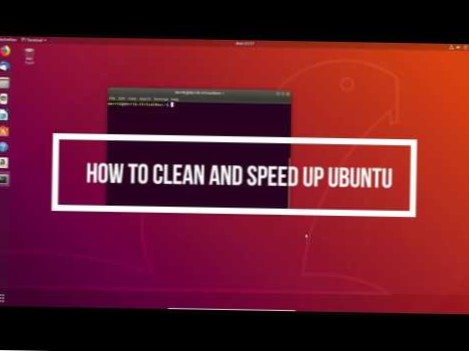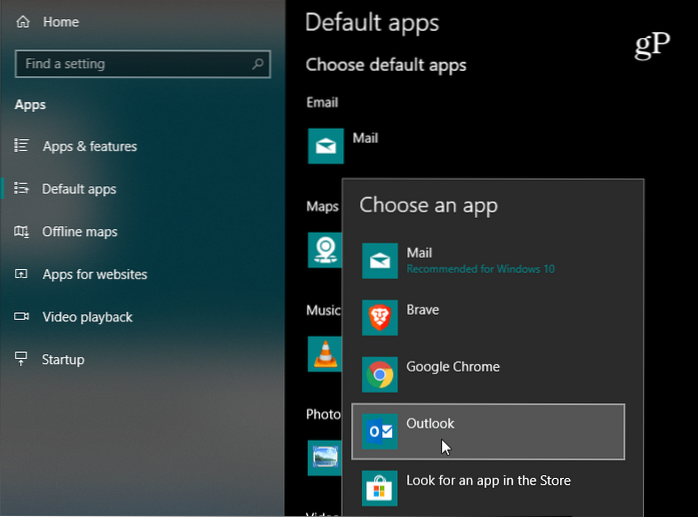These Ubuntu speed up tips cover some obvious steps such as installing more RAM, as well as more obscure ones like resizing your machine's swap space.
- Restart your computer. ...
- Keep Ubuntu updated. ...
- Use lightweight desktop alternatives. ...
- Use an SSD. ...
- Upgrade your RAM. ...
- Monitor startup apps. ...
- Increase Swap space. ...
- Install Preload.
- How can I make Ubuntu 18.04 faster?
- How do I clean up Ubuntu?
- How do I clean up Ubuntu from terminal?
- Why is Ubuntu 20.04 so slow?
- Why is my Ubuntu so slow?
- Why is my Ubuntu VM so slow?
- How do you refresh Ubuntu?
- Is sudo apt-get clean safe?
- Can I delete .cache Ubuntu?
- How do I clean temp files in Ubuntu?
- How do I free up memory on Ubuntu?
- How do I clean up after apt-get update?
How can I make Ubuntu 18.04 faster?
Tips to make Ubuntu faster:
- Reduce the default grub load time: ...
- Manage startup applications: ...
- Install preload to speed up application load time: ...
- Choose the best mirror for software updates: ...
- Use apt-fast instead of apt-get for a speedy update: ...
- Remove language related ign from apt-get update: ...
- Reduce overheating:
How do I clean up Ubuntu?
Steps to Clean Up Your Ubuntu System.
- Remove all the Unwanted Applications, Files and Folders. Using your default Ubuntu Software manager, remove the unwanted applications that you don't use.
- Remove unwanted Packages and Dependencies. ...
- Need to Clean the Thumbnail Cache. ...
- Regularly clean the APT cache.
How do I clean up Ubuntu from terminal?
The 10 Easiest Ways to Keep Ubuntu System Clean
- Uninstall Unnecessary Applications. ...
- Remove Unnecessary Packages and Dependencies. ...
- Clean Thumbnail Cache. ...
- Remove Old Kernels. ...
- Remove Useless Files and Folders. ...
- Clean Apt Cache. ...
- Synaptic Package Manager. ...
- GtkOrphan (orphaned packages)
Why is Ubuntu 20.04 so slow?
If you have Intel CPU and are using regular Ubuntu (Gnome) and want a user-friendly way to check CPU speed and adjust it, and even set it to auto-scale based on being plugged vs battery, try CPU Power Manager. If you use KDE try Intel P-state and CPUFreq Manager.
Why is my Ubuntu so slow?
The Ubuntu operating system is based on the Linux kernel. ... Over time however, your Ubuntu 18.04 installation can become more sluggish. This can be due to small amounts of free disk space or possible low virtual memory due to the number of programs you've downloaded.
Why is my Ubuntu VM so slow?
Ubuntu or other Linux distributions may be slow when you run it within VirtualBox. Often, the cause is that not enough RAM is assigned to the virtual machine, which makes it run slow and makes it unresponsive. ... Then, you open the settings of your virtual Ubuntu and you go to 'Display'. Now tick 'Enable 3D Acceleration'.
How do you refresh Ubuntu?
Step 1) Press ALT and F2 simultaneously. In modern laptop, you may need to additionally press the Fn key too (if it exists) to activate Function keys. Step 2) Type r in the command box and press enter. GNOME should restart.
Is sudo apt-get clean safe?
No, apt-get clean will not harm your system. The . deb packages in /var/cache/apt/archives are used by the system to install software.
Can I delete .cache Ubuntu?
It is generally safe to delete it. You might want to close all graphical applications (e.g. banshee, rhythmbox, vlc, software-center, ..) to prevent any confusion of the programs accessing the cache (where did my file go all of a sudden!?).
How do I clean temp files in Ubuntu?
Open the Activities overview and start typing Privacy. Click on Privacy to open the panel. Select Purge Trash & Temporary Files. Switch one or both of the Automatically empty Trash or Automatically purge Temporary Files switches to on.
How do I free up memory on Ubuntu?
- Clean the APT Cache (And Do It Regularly) It sounds so obvious yet chances are you haven't done this for a while. ...
- Remove Old Kernels (If No Longer Required) ...
- Uninstall Apps & Games You Never Use (And Be Honest!) ...
- Use A System Cleaner like BleachBit. ...
- Stay up to date (seriously, do it!)
How do I clean up after apt-get update?
Clear the APT cache:
The clean command clears out the local repository of downloaded package files. It removes everything except the partials folder and lock file from /var/cache/apt/archives/ . Use apt-get clean to free up disk space when necessary, or as part of regularly scheduled maintenance.
 Naneedigital
Naneedigital



